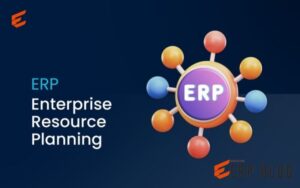ERP – Enterprise Resource Planning (ERP) systems have become integral to modern manufacturing industries, offering a comprehensive approach to managing and streamlining business processes. ERP in manufacturing is designed to integrate various functions such as inventory management, procurement, production, and sales into a unified system. This integration enhances data accuracy, improves operational efficiency, and provides valuable insights that drive decision-making.
As manufacturers face increasing pressure to optimize operations, reduce costs, and improve quality, ERP systems offer a strategic advantage. By consolidating information from different departments, ERP solutions help manufacturers gain real-time visibility into their operations, facilitating better coordination and faster response to market changes.
Table of Contents:
Benefits of ERP in Manufacturing
Implementing an ERP system in manufacturing can significantly transform operations by integrating various business functions into a cohesive platform. This integration leads to numerous advantages that enhance overall efficiency and productivity.
1. Improved Efficiency
ERP systems automate routine tasks and processes, reducing manual data entry and minimizing errors. This automation speeds up production cycles and streamlines workflows, leading to greater operational efficiency.
By automating repetitive tasks, manufacturers can focus on more strategic activities, ultimately enhancing their productivity and efficiency.
2. Enhanced Data Accuracy
With all critical data stored in a single system, ERP solutions eliminate discrepancies and ensure data consistency across the organization. This accuracy is crucial for making informed decisions and maintaining quality standards. Accurate data facilitates better forecasting, planning, and control over manufacturing processes, reducing the likelihood of costly mistakes.
3. Better Inventory Management
ERP systems provide real-time visibility into inventory levels, helping manufacturers manage stock more effectively. This visibility reduces excess inventory, minimizes stockouts, and optimizes supply chain management. By improving inventory management, manufacturers can reduce carrying costs and improve their ability to meet customer demands.
Unlocking Efficiency: A Comprehensive Guide to ERP 9.0 and Its Benefits

4. Streamlined Compliance
ERP systems assist manufacturers in complying with industry regulations and standards by providing accurate and up-to-date records. This feature is particularly important in industries with stringent compliance requirements. By maintaining accurate records and ensuring adherence to regulations, manufacturers can avoid legal issues and enhance their reputation.
4. Informed Decision-Making
The analytical capabilities of ERP systems allow manufacturers to generate detailed reports and insights. These insights help in strategic planning and operational improvements by providing a clear understanding of business performance. With access to real-time data and comprehensive analytics, manufacturers can make more informed decisions and drive continuous improvement.
Recommended ERP Systems for Manufacturing
Selecting the right ERP system is crucial for maximizing the benefits and ensuring a successful implementation. Here are some top ERP systems recommended for manufacturing businesses:
1. SAP S/4HANA
Known for its robust functionality and scalability, SAP S/4HANA offers comprehensive modules tailored to manufacturing needs, including production planning, supply chain management, and quality control. Its advanced features and integration capabilities make it a strong choice for manufacturers seeking a powerful ERP solution.
2. Oracle ERP Cloud
Oracle ERP Cloud provides a wide range of tools for managing finance, procurement, and project management. Its advanced analytics and cloud-based infrastructure make it suitable for manufacturers seeking flexibility and innovation. The cloud-based nature of Oracle ERP Cloud allows for scalability and remote access.
3. Microsoft Dynamics 365
Microsoft Dynamics 365 integrates seamlessly with other Microsoft products and offers modules for finance, operations, and supply chain management. Its user-friendly interface and customization options make it a popular choice among manufacturers. Dynamics 365’s ability to integrate with existing Microsoft tools enhances its functionality and ease of use.
Understanding ERP Process: A Comprehensive Guide for Businesses

Tips for Choosing an ERP System in Manufacturing
Selecting the right ERP system requires careful consideration of several factors to ensure it meets the specific needs of your manufacturing business.
1. Assess Your Needs
Identify the specific needs and challenges of your manufacturing process. Choose an ERP system that aligns with your requirements and can address your unique operational demands. Conduct a thorough analysis of your processes and determine which features are most critical for your business.
2. Consider Scalability
Select an ERP solution that can grow with your business. Ensure it can accommodate future expansions and additional functionalities without significant disruptions. Scalability is essential for supporting long-term growth and adapting to changing market conditions.
3. Evaluate Integration Capabilities
Check how well the ERP system integrates with your existing tools and technologies. Seamless integration is crucial for ensuring smooth data flow and operational efficiency. Evaluate the system’s compatibility with other software and platforms used in your organization.
4. Check Vendor Support
Evaluate the level of support and training provided by the ERP vendor. Adequate support is essential for a smooth implementation and ongoing maintenance. Ensure that the vendor offers comprehensive training and responsive customer support.
5. Review Cost and ROI
Analyze the total cost of ownership, including implementation, licensing, and maintenance fees. Consider the potential return on investment and long-term benefits of the ERP system. Compare costs with the expected improvements in efficiency and productivity to determine the system’s value.
FAQs
Conclusion
ERP systems are a powerful tool for enhancing efficiency and productivity in the manufacturing sector. By integrating various business functions into a unified system, manufacturers can achieve greater operational efficiency, improve data accuracy, and make more informed decisions.
Unlocking the Benefits of ERP Reporting for Your Business

When selecting an ERP solution, it is essential to consider your specific needs, scalability, integration capabilities, and total cost. With the right ERP system in place, manufacturers can streamline their operations and stay competitive in a dynamic market.

